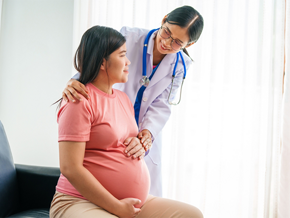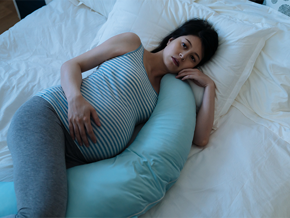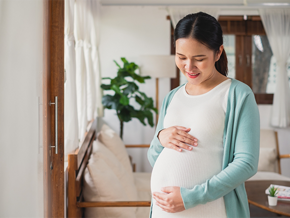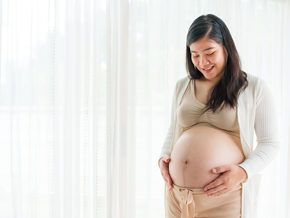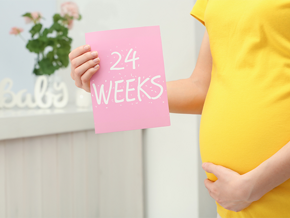
28 Weeks Pregnant: Baby Development, Symptoms, and Tips for Mommies
Congratulations, you’re 28 weeks pregnant and in your seventh month! You’ve officially reached the third trimester and are entering the final stretch of your pregnancy journey. Here's what you need to know about your little one's growth and symptoms to expect.
28 Weeks Pregnant: Baby Development
Your baby now weighs around 1 kg (2.2 lb.) and measures around 36 to 38 cm, roughly the length of a large eggplant. Here's the progress of their growth:
Lungs and brain are developing
This week brings two milestones. Your baby’s lungs are now mature enough to breathe air, and they're preparing for their first breath by taking practice swallows of amniotic fluid.
At the same time, their brain is so active that it now shows distinct sleep cycles, including REM (rapid eye movement), which means your baby is likely dreaming!
Senses are sharpening
Your baby's eyelids can open and close already, and they may be able to see the light that filters through your womb. A 2025 study in the Journal of Developmental Science highlights that fetuses respond to light patterns this early, even showing a preference for face-like shapes from 26 weeks onward.
Position in the womb still shifting
At 28 weeks pregnant, the baby position is still breech (bottom-down). But there’s still plenty of room in your uterus for them to move around and change positions.
Most babies naturally move into their final head-down position between 34 weeks and 36 weeks, so your doctor will continue to monitor your baby’s position in the coming weeks.
You may also begin to notice a pattern to your baby’s kicks. Tracking these can help you feel connected and spot any changes early.
Common Symptoms You May Experience

Backaches and leg cramps are typical as your body supports your growing baby. Gentle stretches can help ease discomfort.
As your baby grows and becomes more active, you'll feel more physical changes. Here’s what you can expect:
Backache and pelvic pressure
The extra weight from your baby and uterus puts a strain on your body, leading to that all-too-familiar backache at 28 weeks pregnant. A comprehensive meta-analysis published in BMC Pregnancy and Childbirth found that 47.8% of expectant mothers in their third trimester experience low back pain during pregnancy.
You may also notice pelvic pressure as your body prepares for delivery. Wearing a supportive belly band and comfortable shoes can make a big difference.
Braxton Hicks contractions
You might feel a temporary, painless tightening of your abdomen, also known as Braxton Hicks contractions. These are your uterus' way of practicing labor.
The American College of Obstetricians and Gynecologists (ACOG) describes them as irregular contractions that don't get stronger or closer together. They should ease up if you change your position or drink some water.
Leg cramps and swelling
Poor circulation and pressure from the baby on major blood vessels can cause leg cramps and swollen ankles. A recent study on treatments for leg cramps found that management techniques, like local heat application, massage, and regular stretching, were effective in providing relief.
Try to prop your feet up whenever you can and engage in gentle stretching before bed.
Your Nutrition at 28 Weeks Pregnant
Eating healthy in your third trimester is crucial to support your baby’s final growth spurt. Focus on key nutrients such as:
- Iron helps prevent anemia and supports your increased blood volume.
- Protein is vital for your baby’s cell and muscle growth.
- DHA (an omega-3 fatty acid) is essential for your baby’s brain and eye development.
A 2024 systematic review confirmed that a mother's diet, particularly her intake of fatty fish, increases the amount of beneficial fatty acids like DHA in her breast milk later on.
While gaining 7 to 11 kg by this week is a common average cited by the American Pregnancy Association, it's essential to discuss your targets with your ob-gyn. Check out these pregnancy meal plan ideas for ideas on what food to eat at 28 weeks pregnant.
Tips to Keep You Healthy (and Comfortable!)

Start a checklist for your hospital bag and discuss your birth preferences with your partner.
It's typical to feel a mix of excitement and anxiety as your due date gets closer. With the finish line in sight, a little preparation can help you stay relaxed and in control.
1. Prioritize sleep and rest.
Try sleeping on your side, as this position helps improve blood flow to your baby and other organs. The Sleep Foundation explains that side-sleeping prevents the weight of your growing uterus from compressing the inferior vena cava, a central vein that carries blood back to your heart from your lower body.
Use pillows to support your belly and back for added comfort, and listen to your body, taking short rests during the day if you feel tired.
2. Stay active (if your doctor allows it).
A review in the American Journal of Obstetrics & Gynecology MFM confirmed that regular physical activity during pregnancy is not only safe but can also help improve mental health and reduce risks of complications, such as preeclampsia.
Try gentle exercise like walking, swimming, or prenatal yoga to alleviate backaches, improve your mood, and boost your energy levels. Always consult your doctor before starting a new exercise routine.
3. Support your mental and emotional well-being.
Mood swings and emotional ups and downs can intensify in the third trimester due to hormonal shifts, physical discomfort, and the anticipation of birth.
To stay grounded, try mindfulness techniques like deep breathing, light journaling, or guided meditation. Stay connected with your support system and talk to your doctor if you feel overwhelmed.
4. Begin your preparations for delivery.
Involve your partner in packing your hospital bag and discussing your birth plan. Having these things ready can reduce anxiety as your due date approaches.
You should also schedule your glucose screening test around this time to check for gestational diabetes.
When to Call Your Doctor
Wondering what 28 weeks pregnant symptoms not to ignore? Contact your doctor or midwife immediately if you experience any of the following:
- A significant decrease in your baby’s movements
- Severe or persistent headaches, vision changes (like flashing lights), or sudden swelling in your hands, face, or feet as these could be signs of preeclampsia
- Vaginal bleeding or leakage of fluid
- Intense and regular abdominal pain or contractions that get stronger and closer together, which could be a sign of preterm labor
By understanding what’s happening with your baby and your body when you’re 28 weeks pregnant, you can go through this final trimester feeling confident and prepared.
Got more questions? Join the ParentTeam Moms and Dads Facebook group and connect with other parents as you prepare for your baby at 28 weeks pregnant.
References
American College of Obstetricians and Gynecologists (ACOG). “Physical Activity and Exercise During Pregnancy and the Postpartum Period.” Committee Opinion No. 804. Obstetrics & Gynecology 135 (4): e178-e188. Accessed June 23, 2025. https://www.acog.org/clinical/clinical-guidance/committee-opinion/articles/2020/04/physical-activity-and-exercise-during-pregnancy-and-the-postpartum-period
American College of Obstetricians and Gynecologists (ACOG). “How Your Fetus Grows During Pregnancy.” FAQ156, January 2024. Accessed June 23, 2025. https://www.acog.org/womens-health/faqs/how-your-fetus-grows-during-pregnancy
Fetal Medicine Foundation, The. n.d. “Fetal Growth Assessment.” Accessed June 23, 2025. https://fetalmedicine.org/research/assess/growth
HCA Healthcare UK. n.d. “Week 28 of Pregnancy (Days 196-202).” Accessed June 23, 2025. https://www.thebirthcompany.co.uk/your-pregnancy-guide/pregnancy-week-twenty-eight
Mayo Clinic. 2025. “Fetal Development: The Third Trimester.” March 18, 2025. Accessed June 23, 2025. https://www.mayoclinic.org/healthy-lifestyle/pregnancy-week-by-week/in-depth/fetal-development/art-20045997
MedlinePlus. 2023. “Fetal Development.” Last reviewed August 23, 2023. Accessed June 23, 2025. https://medlineplus.gov/ency/article/002398.htm
Morales-Suárez-Varela, María, Eva Clemente-Bosch, Isabel Peraita-Costa, Agustín Llopis-Morales, Isabel Martínez, and Agustín Llopis-González. “Maternal Physical Activity During Pregnancy and the Effect on the Mother and Newborn: A Systematic Review.” Journal of Physical Activity and Health 18 (1): 130–147. December 22, 2020. Accessed June 23, 2025.
https://doi.org/10.1123/jpah.2019-0348
National Health Service (NHS). n.d. “Week 28.” In “Your Week-by-Week Guide to Pregnancy.” Accessed June 23, 2025. https://www.nhs.uk/start-for-life/pregnancy/week-by-week-guide-to-pregnancy/3rd-trimester/week-28/
Pregnancy, Birth & Baby. “Leg Cramps During Pregnancy.” Last reviewed May 2024. https://www.pregnancybirthbaby.org.au/leg-cramps-during-pregnancy
Raising Children Network (Australia). n.d. “28 Weeks Pregnant.” Accessed June 23, 2025. https://raisingchildren.net.au/pregnancy/week-by-week/third-trimester/28-weeks
















